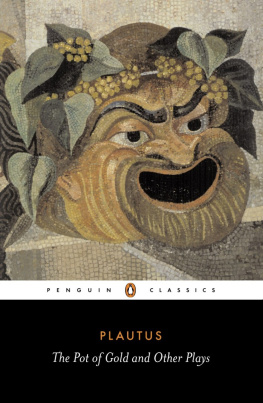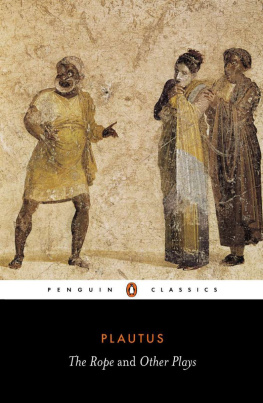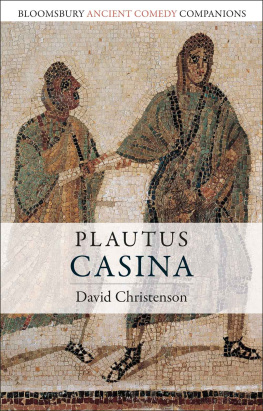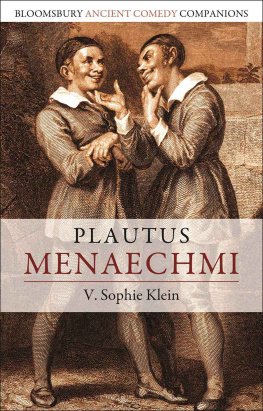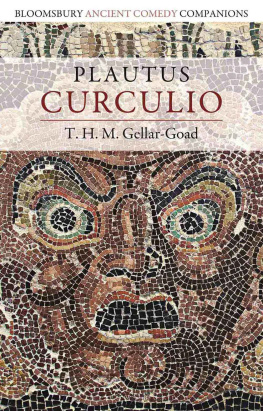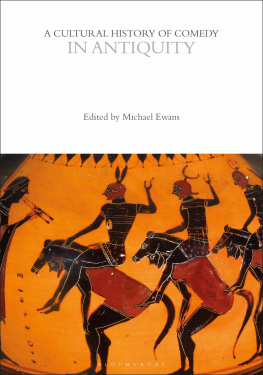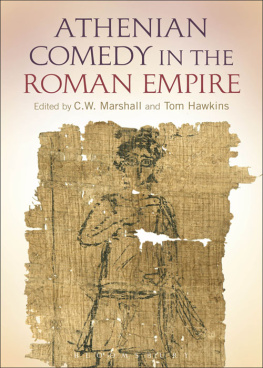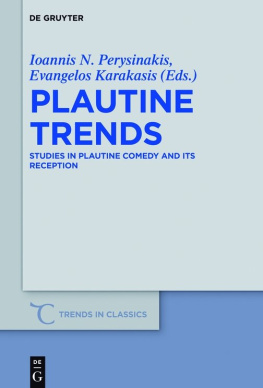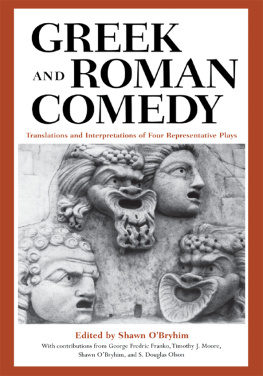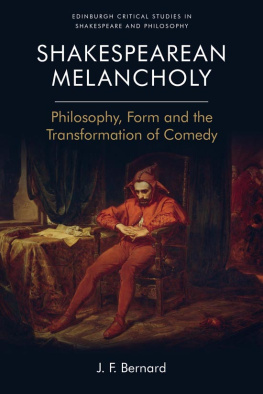
THE POT OF GOLD
AND OTHER PLAYS
Advisory Editor: Betty Radice
TITUS MACCIUS PLAUTUS was born in Sarsina, Umbria, in about 254 B.C., and was originally named, after his father, Titus. Little is known of his life, but it is believed that he went to Rome when young and worked as a stage assistant. His potential as an actor was discovered and he acquired two other names: Maccius, derived perhaps from the name of a clown in popular farce, and Plautus, a cognomen meaning flat-footed.
Somehow Plautus saved enough capital to go into business as a merchant shipper, but this venture collapsed, and he worked (says the tradition) as a millers labourer, and in his spare time studied Greek drama. From the age of forty onwards he achieved increasing success as an adaptor of Greek comedies for the Roman stage. Much of his work seems to be original, however, and not mere translation. He was rewarded by being granted Roman citizenship. According to Cicero he died in 184 B.C.
E. F. WATLING was educated at Christs Hospital and University College, Oxford. His translations of Greek and Roman plays for the Penguin Classics include the seven plays of Sophocles, nine plays of Plautus, and a selection of the tragedies of Seneca. He died in 1990.
PLAUTUS
THE POT OF GOLD
THE PRISONERS
THE BROTHERS MENAECHMUS
THE SWAGGERING SOLDIER
PSEUDOLUS
TRANSLATED BY
E. F. WATLING
PENGUIN BOOKS
PENGUIN BOOKS
Published by the Penguin Group
Penguin Books Ltd, 80 Strand, London WC2R 0RL, England
Penguin Putnam Inc. , 375 Hudson Street, New York, New York 10014, USA
Penguin Books Australia Ltd, 250 Camberwell Road, Camberwell, Victoria 3124, Australia
Penguin Books Canada Ltd, 10 Alcorn Avenue, Toronto, Ontario, Canada M4V 3B2
Penguin Books India (P) Ltd, 11 Community Centre, Panchsheel Park, New Delhi 110 017, India
Penguin Books (NZ) Ltd, Cnr Rosedale and Airborne Roads, Albany, Auckland, New Zealand
Penguin Books (South Africa) (Pty) Ltd, 24 Sturdee Avenue, Rosebank 2196, South Africa
Penguin Books Ltd, Registered Offices: 80 Strand, London WC2R 0RL, England
www.penguin.com
This translation first published 1965
37
Copyright E. F. Watling, 1965
All rights reserved
The terms for performance of these plays may be
obtained from the Society of Authors
84 Drayton Gardens, London SWI 9SD
to whom any application for
permission should be made
Except in the United States of America, this book is sold subject to the condition that it shall not, by way of trade or otherwise, be lent, re-sold, hired out, or otherwise circulated without the publishers prior consent in any form of binding or cover other than that in which it is published and without a similar condition including this condition being imposed on the subsequent purchaser
9780141911229
CONTENTS
THE POT OF GOLD
(AULULARIA)
THE PRISONERS
(CAPTIVI)
THE BROTHERS MENAECHMUS
(MENAECHMI)
THE SWAGGERING SOLDIER
(MILES GLORIOSUS)
T. MACCIUS PLAUTUS (c. 254184 B.C . ) Wrote comedies for the Roman stage, based on, and probably in part translated from, Greek comedies of the fourth and third centuries. His scenes and characters remain nominally Greek but reflect Roman manners and contemporary life and the influence of a popular taste for broad and lively rather than contemplative or romantic comedy.
A fuller discussion of the life and work of Plautus will be found in the Introduction to the first volume of this series of translations, The Rope and Other Plays (Penguin Classics).
THE POT OF GOLD
(AULULARIA )
INTRODUCTORY NOTE TO
THE POT OF GOLD
THE character of the miserly old man must have had an ancestry in the Greek Comedy which supplied Plautus with his models; among others, Smicrines in The Arbitration of Menander is a recognizable prototype of the Euclio of Aulularia, though Plautuss play as a whole bears no resemblance to any known Greek forerunner. A double clue to the dating, both of the original and the copy, has been detected in the references to womens extravagance and the office of censor of female conduct: placing the Greek comedy in the decade 31707 B.C. , when this topic engaged the attention of Demetrius of Phalerum, governor of Athens under Macedonian rule, and the Roman comedy near to 195 B.C. , when relief was obtained from the restraints of the Oppian Law. Neither of these ascriptions has conclusive validity.
Of the numerous successors of Euclio, the Harpagon of Molires LAvare is the best known and most complete reincarnation; yet the comparison between the two plays shows a world of difference in the authors treatment of the subject and the character. Euclios avarice- or rather his unexpected acquisition of unearned wealth - brings only gentle ridicule upon his head and involves him in a train of inconveniences, from which he eventually escapes with his honour and good nature unimpaired. Harpagon remains a miser and a curmudgeon to the end.
The end of Aulularia is, in fact, only known to us in outline from the arguments (those metrical summaries of the plot, usually in two alternative versions, added to the plays by later Roman editors). These inform us that Euclio recovered his gold and made a present of it to his daughter and son-in-law; and note may also be taken of the one significant Une among a few unplaceable fragments surviving from the missing last act: nec noctu nec diu quietus unquam eram; nunc dormiam (I have never had a moments peace by day or night; now I am going to sleep). From these clues I have ventured to construct a final scene, to indicate the probable denouement and to restore the completeness of this peculiarly enjoyable and genial comedy. Here Plautus, as nowhere else in his work, concentrates his attention on a single and simple topic, building the play around its central personage, with the minimum of digression or adventitious by-play; indeed there is not a single incident that does not connect neatly and necessarily with the progress of the plot.
There is one curious piece of confusion in the texts, with regard to the names of the slaves. The received texts assign the speech at line 363 to a slave named Pythodicus, who makes no other appearance. On the other hand, the slave of Lyconides, who appears at line 587, has been labelled Strobilus, on the doubtful evidence of Unes 697 and 804, where this name appears to have been given to him, although it is also the name of the head steward in Megadoruss house. It is very unlikely, and dramatically unsuitable, that these two Strobiluses should be one and the same person; one is a responsible factotum in Megadoruss employ, the other a mischievous youth and the property of Lyconides. It seems an obvious solution (as indicated in Lindsays text) to eliminate Pythodicus, whose one speech is entirely appropriate and indeed necessary to Strobilus, and to leave the younger slave anonymous.
CHARACTERS
| LAR FAMILIARIS | a Household God, as Prologue |
| EUCLIO | a miserly old man |
| STAPHYLA | his housekeeper |
| MEGADORUS | his neighbour, an elderly bachelor |
| EUNOMIA | sister of Megadorus |
| LYCONIDES | a young man, son of Eunomia |
| STROBILUS | steward to Megadorus |
| CONGRIO |

